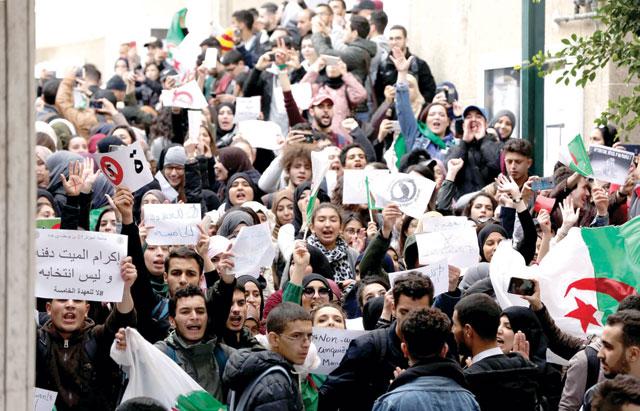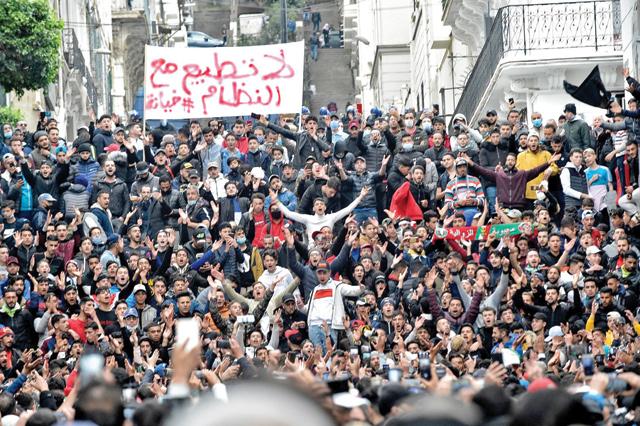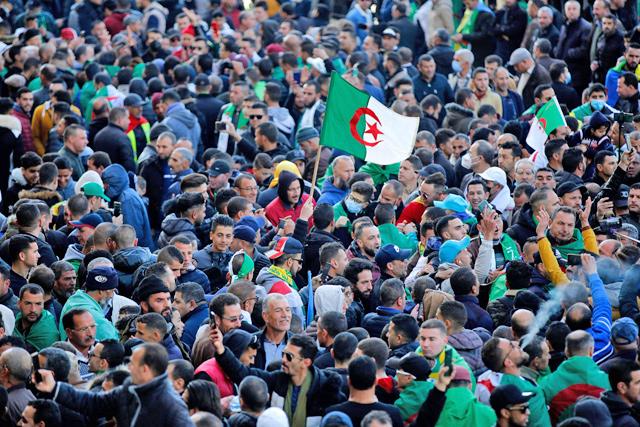You are here
Algeria: president's bid for 5th term sparks protests
By AFP - Feb 26,2019 - Last updated at Feb 26,2019

Students protest inside university campus against President Abdelaziz Bouteflika's plan to extend his 20-year rule by seeking a fifth term in Algiers, Algeria, on Tuesday (Reuters photo)
ALGIERS — The announcement on February 10 that Algeria's ailing President Abdelaziz Bouteflika will run for a fifth term unleashed a series of protests in the North African country.
Here is a timeline:
New bid confirmed
On February 10 Bouteflika ends weeks of speculation and confirms that he intends to seek a fifth term in the April 18 elections.
The 81-year-old, who became president in 1999, acknowledges his weakened state of health, which has left him in a wheelchair and rarely seen in public since suffering a stroke in 2013.
"But the unwavering desire to serve... has never left me and it allows me to transcend the constraints linked to health troubles which everyone may one day face," he says.
Massive protest
On February 22 tens of thousands of people demonstrate in several cities including the capital Algiers where protests have been banned since 2001.
"No fifth mandate," chant the mostly young demonstrators in Algiers.
There are scuffles between demonstrators and security forces who fire tear gas. Around 40 people are rounded up.
A security official, speaking on condition of anonymity, tells AFP some 20,000 people had demonstrated nationwide. The scale of the turnout takes many by surprise.
On February 23 police force wealthy businessman Rachid Nekkaz to leave Algiers after he draws several hundred people to an event as part of his bid to collect enough backing to present his candidature for the elections.
New demonstration
On February 24 hundreds of people take to the streets of Algiers in a new demonstration, although the turnout is lower than in the previous protests.
Police spray tear gas and use a water canon to disperse the protests, who chant, "Algeria, free and democratic". More are rounded up.
Hundreds of people in Paris, where there is a large Algerian community, also demonstrate against Bouteflika.
With state media silent on the protests, national radio journalists protest that they are being prevented from reporting on the opposition to Bouteflika.
In an unsigned letter to management seen by AFP, they slam the "decision by the hierarchy to ignore" the rallies and deplore the skewing of coverage in favour of the incumbent.
Bouteflika heads to Geneva for "routine medical checks".
Students join in
In the first official reaction to the protests, Prime Minister Ahmed Ouyahia calls on February 25 for "vigilance" at demonstrations and says it should be left to voters "to decide in a peaceful and civilised way" if Bouteflika gets a fifth term.
Around a hundred lawyers also protest, waving placards bearing messages saying that they are "with the people".
On February 26 around 500 students demonstrate on the main campus of the University of Algiers in the latest rally against Bouteflika's candidacy.
University guards lock the gates of the city centre campus to prevent the students, who shout, "No to a fifth term" and "Bouteflika get out", from spilling onto the streets of the capital.
Protests take place on other campuses and in various cities while around 100 march in the city centre of Algiers.
Media watchdog Reporters Without Borders accuses the authorities of tyring to gag media coverage of the protests, including through intimidation and arrests, and by slowing down the internet.
Authorities announce that Bouteflika will formally submit his candidature on March 3.
Related Articles
ALGIERS — Algeria voted on Saturday in a parliamentary election overshadowed by a crackdown on a long-running protest movement that has camp
ALGIERS — Thousands of Algerians marched on Monday in the capital and other cities to mark the second anniversary of the North African natio
KHERRATA, Algeria — Several thousand Algerians rallied in a northern town Tuesday, almost two years since the start of the "Hirak" protests
















